David Petersen's Blog, page 30
March 3, 2020
2020 Bookplate
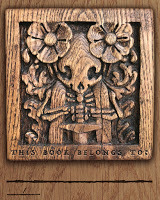 For the last eight years, I've been releasing a yearly bookplate. (Click here for a look at last years as well as a rundown of the previous ones) The purpose of my bookplates it to offer an interesting mini-print that also serves a purpose. Since the final versions are signed and numbered, even if you can't bring me your physical copy of a Mouse Guard book, this bookplate can be glued in to your book making your copy signed.
For the last eight years, I've been releasing a yearly bookplate. (Click here for a look at last years as well as a rundown of the previous ones) The purpose of my bookplates it to offer an interesting mini-print that also serves a purpose. Since the final versions are signed and numbered, even if you can't bring me your physical copy of a Mouse Guard book, this bookplate can be glued in to your book making your copy signed.I'll have the bookplate at my 2020 conventions and in my online store soon after Emerald City Comic Con. For this blogpost, I wanted to go through the process to create the bookplate image.
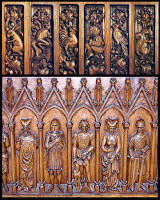 For the bookplate art I'm often inspired by the craft of artistic endeavors the mice in my books would do to beautify their world. In the past I've done (or emulated) stained glass, a woodcut print, embroidery, engraving, mosaic, and painted wood. This year I wanted to do a relief carving in wood.
For the bookplate art I'm often inspired by the craft of artistic endeavors the mice in my books would do to beautify their world. In the past I've done (or emulated) stained glass, a woodcut print, embroidery, engraving, mosaic, and painted wood. This year I wanted to do a relief carving in wood.I'd gathered a few images in a Mouse Guard reference folder on my computer for inspiration for future drawings––but when getting ready for the 2020 bookplate, I couldn't help put want to try my paw at making a carving for real.
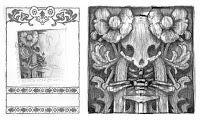 But before wood could be carved, I needed an image. My mother had just passed away and I had death imagery on my mind, so I looked back to the card art for the Mouse Guard Roleplaying condition cards that had stylized Día de Muertos-like skeletal mice on the borders. I printed out an enlarged one for reference, and then in the open space, did a rendered pencil drawing of a skeleton mouse holding a sword surrounded by acanthus-leaf designs and with a flower overlapping the skull in place of an ear shape. I only drew half of it, because I wanted it to be roughly symmetrical. I scanned the drawing into Photoshop and mirrored it so I had a full version of the art I wanted to carve.
But before wood could be carved, I needed an image. My mother had just passed away and I had death imagery on my mind, so I looked back to the card art for the Mouse Guard Roleplaying condition cards that had stylized Día de Muertos-like skeletal mice on the borders. I printed out an enlarged one for reference, and then in the open space, did a rendered pencil drawing of a skeleton mouse holding a sword surrounded by acanthus-leaf designs and with a flower overlapping the skull in place of an ear shape. I only drew half of it, because I wanted it to be roughly symmetrical. I scanned the drawing into Photoshop and mirrored it so I had a full version of the art I wanted to carve.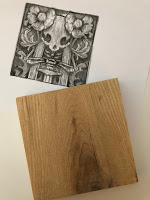 I resized the art printout to match a piece of oak I had in my workshop.
I resized the art printout to match a piece of oak I had in my workshop.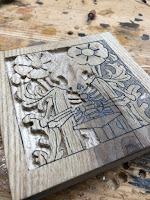 I transferred the art to the wood by rubbing graphite on the back of my printout and then taping it to the block and tracing over the important shapes with a ball-point pen. Here I've already stared removing all the deepest areas.
I transferred the art to the wood by rubbing graphite on the back of my printout and then taping it to the block and tracing over the important shapes with a ball-point pen. Here I've already stared removing all the deepest areas.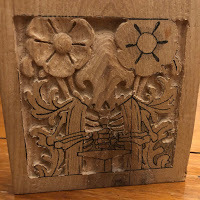 To do the carving, I almost exclusively relied on some engraving bits and a few sanding drums for my dremel tool. While I got a little excited to start adding shape and relief on the flower and skull, I found that removing all the deepest areas first was the best place to start.
To do the carving, I almost exclusively relied on some engraving bits and a few sanding drums for my dremel tool. While I got a little excited to start adding shape and relief on the flower and skull, I found that removing all the deepest areas first was the best place to start.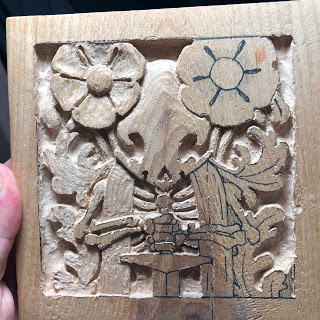 Once the deep areas were gone, I could start removing bits of elevation to the acanthus and the mouse's stole so the arm bones looked like they were in front of them.
Once the deep areas were gone, I could start removing bits of elevation to the acanthus and the mouse's stole so the arm bones looked like they were in front of them.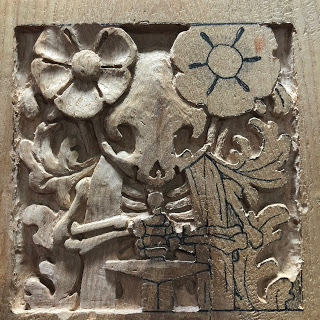 I used the left side as a testing ground for how and when to shape forms and add details.
I used the left side as a testing ground for how and when to shape forms and add details.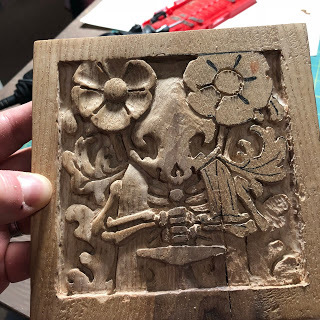 Here I've started to cut in the deep parts of the right flower and add depth to the acanthus background on the right side.
Here I've started to cut in the deep parts of the right flower and add depth to the acanthus background on the right side.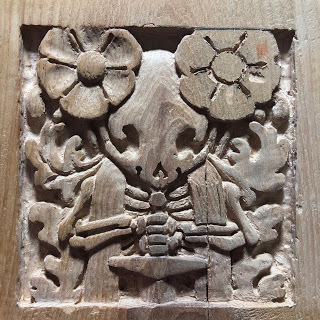 more progress on getting those background bits deeper into the image.
more progress on getting those background bits deeper into the image.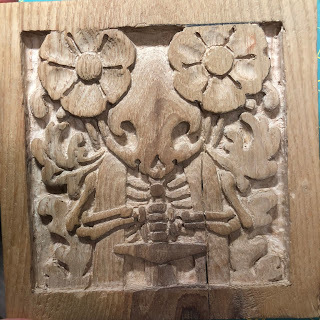 While I'd push and fine-tune the depth levels of everything more as I'd go on, here all the main elements are carved to their proper heights and it's detail work and shaping from here out.
While I'd push and fine-tune the depth levels of everything more as I'd go on, here all the main elements are carved to their proper heights and it's detail work and shaping from here out.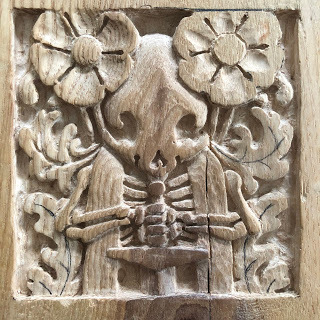 I quickly drew back in the lines for the acanthus designs I'd lost when carving them to their proper depth.
I quickly drew back in the lines for the acanthus designs I'd lost when carving them to their proper depth.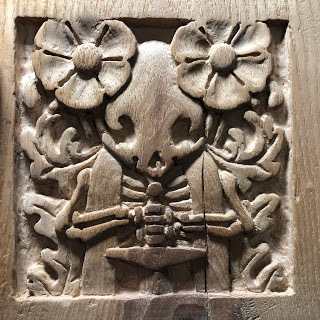 Carving part done!
Carving part done!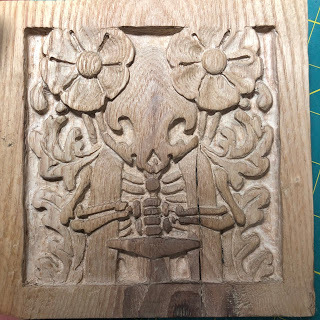 Then came sanding...LOTS of sanding with little bits of folded fine-grit sandpaper to get down into the crevices.
Then came sanding...LOTS of sanding with little bits of folded fine-grit sandpaper to get down into the crevices. 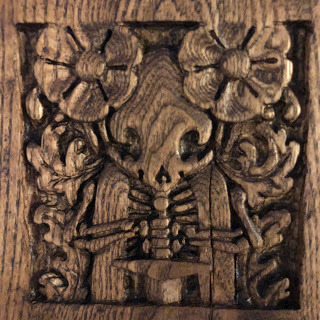 A dark stain was added uniformly over the whole piece and left to dry.
A dark stain was added uniformly over the whole piece and left to dry.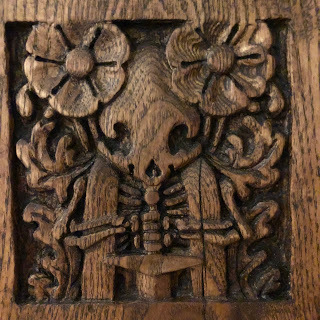 To really get the shadows to look dark, I carefully pooled up more dark stain in the deeper parts of the carving using a cotton swab (and rubbed away any excess that got onto any other bits)
To really get the shadows to look dark, I carefully pooled up more dark stain in the deeper parts of the carving using a cotton swab (and rubbed away any excess that got onto any other bits)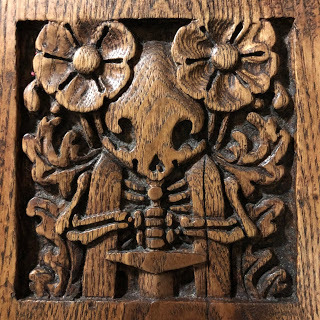 Last step was to VERY lightly sand the highlights with 0000 steel wool and super fine sandpaper to remove a bit of the stain from the highest points. When I was done, I sealed the piece with a few coats of paste wax.
Last step was to VERY lightly sand the highlights with 0000 steel wool and super fine sandpaper to remove a bit of the stain from the highest points. When I was done, I sealed the piece with a few coats of paste wax.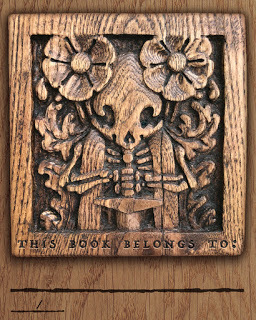 The final piece photographed in natural light and then dropped into the bookplate template.
The final piece photographed in natural light and then dropped into the bookplate template.2020 Appearances
Emerald City Comic Con: March 12-15
FACTS-Ghent Belgium: April 4-5
Heroes Con: June 19-21
San Diego Comic Con: July 22-26
New York Comic Con: October 8-11
Baltimore Comic Con: Oct 23-25
Published on March 03, 2020 06:00
February 25, 2020
Hornblower Print Process
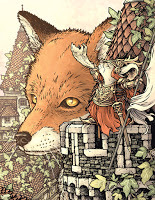 In 2020 I'll be introducing some new prints to my convention & online store offerings (Expected to debut at ECCC and in my online store in the weeks following). These won't just be new images, but a new format I haven't done before: 9"x12". The plan is for them to be full-bleed (the image goes off the edge of the paper) and we will sell them backed and bagged. So-far, it looks like I have 3 of them ready to send off to the printer.
In 2020 I'll be introducing some new prints to my convention & online store offerings (Expected to debut at ECCC and in my online store in the weeks following). These won't just be new images, but a new format I haven't done before: 9"x12". The plan is for them to be full-bleed (the image goes off the edge of the paper) and we will sell them backed and bagged. So-far, it looks like I have 3 of them ready to send off to the printer.For this blogpost, I'll be walking through the process for the Hornblower Guardmouse print you can see to the left.
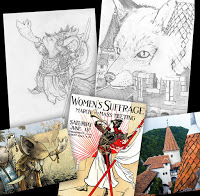 The inspiration for the piece was a Woman's Sufferage meeting propaganda poster that I came across online. I loved the pose and the armor––and felt it was a great starting point for a Mouse Guard piece. So, I drew my guardmouse version of the hornblower, but replaced the metal horn with a tooth-horn borrowed from the Legends of the Guard Vol 1 cover tale. The fox was suggested by Julia and the castle-rooftop was done referencing Bran Castle in Romania. I drew my pencils on copy paper with a 0.5 lead in a mechanical pencil.
The inspiration for the piece was a Woman's Sufferage meeting propaganda poster that I came across online. I loved the pose and the armor––and felt it was a great starting point for a Mouse Guard piece. So, I drew my guardmouse version of the hornblower, but replaced the metal horn with a tooth-horn borrowed from the Legends of the Guard Vol 1 cover tale. The fox was suggested by Julia and the castle-rooftop was done referencing Bran Castle in Romania. I drew my pencils on copy paper with a 0.5 lead in a mechanical pencil.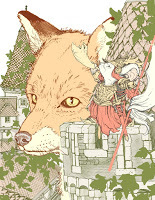 After I had my pencils scanned in, I composed the final layout in Photoshop (truth be told, I started doing this right after I had the mouse drawn). I tint each drawing a different color to help me see the various elements. for the same reason, and to block in my understanding of the forms, I did a quick digital coloring job. It was at that digital coloring stage that I also blobbed in some vines of ivy draping over the castle roofs and towers.
After I had my pencils scanned in, I composed the final layout in Photoshop (truth be told, I started doing this right after I had the mouse drawn). I tint each drawing a different color to help me see the various elements. for the same reason, and to block in my understanding of the forms, I did a quick digital coloring job. It was at that digital coloring stage that I also blobbed in some vines of ivy draping over the castle roofs and towers.There's a part of me that was coming up with context for this image being a past matriarch on the tower parapet of Lockhaven, with a fox companion signaling for the Guard.
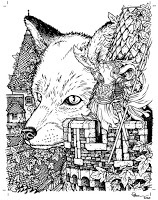 I printed out the above layout onto copy paper, and then taped that to the back of a sheet of 11"x 14" Strathmore bristol. On my Huion lightpad, I could see through the surface of the bristol to the printout below so I could ink the piece.
I printed out the above layout onto copy paper, and then taped that to the back of a sheet of 11"x 14" Strathmore bristol. On my Huion lightpad, I could see through the surface of the bristol to the printout below so I could ink the piece.I inked with Copic Multiliner SP pens (I think I almost exclusively used the 0.7 nib for this piece).
The inking process was something I broadcast on my Twitch Chanel (twitch.tv/davidpetersen) as fans watched and could ask me questions.
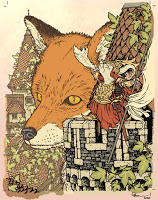 After I finished the inks, I scanned them and moved on to the first part of the digital coloring stage called flatting (something else I did LIVE on my Twitch Chanel). This is the step where I place in flat colors to establish the color palate and to define where all the colors are (what is ivy, what is shingle, what is white fur, what is orange, what is armor, what is cloth or cording, etc.). To push back the depth and add some effects, I also established a lot of color holds. These are places I want the inkwork to be a color other than black...so the distance linework became a brown, the fox became a bit lighter, the engraving on the horn was tinted to look more like scrimshaw---and purely as a digital addition, I drew in whiskers on the fox.
After I finished the inks, I scanned them and moved on to the first part of the digital coloring stage called flatting (something else I did LIVE on my Twitch Chanel). This is the step where I place in flat colors to establish the color palate and to define where all the colors are (what is ivy, what is shingle, what is white fur, what is orange, what is armor, what is cloth or cording, etc.). To push back the depth and add some effects, I also established a lot of color holds. These are places I want the inkwork to be a color other than black...so the distance linework became a brown, the fox became a bit lighter, the engraving on the horn was tinted to look more like scrimshaw---and purely as a digital addition, I drew in whiskers on the fox.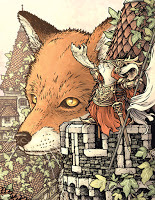
The last step was to do the final colors on the piece. I only did a little bit of this step on Twitch (though I did work on the tower stone and the shingles). The rendering and the texture are done simultaneously as I use a stock textured brush when I'm using the dodge and burn tools to add highlights and shadows.
2020 Appearances ***JUST ADDED*** C2E2: Feb. 28-March 1
Emerald City Comic Con: March 12-15FACTS-Ghent Belgium: April 4-5Heroes Con: June 19-21San Diego Comic Con: July 22-26New York Comic Con: October 8-11Baltimore Comic Con: Oct 23-25
Published on February 25, 2020 06:00
February 18, 2020
Recent Commissions
At conventions I do 9"x12"toned paper commissions for fans. They cost $250 and I only accept them when I'm at a show--I unfortunately cannot keep an open list when I'm at home and stay productive on more Mouse Guard pages. I wanted to share some recent ones--especially since I'll be at C2E2 at the end of the month! It's a last minute addition to my convention schedule and the first time back in a several years.
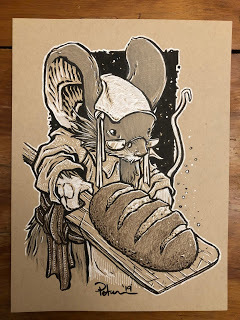 Mouse Baker
Mouse Baker
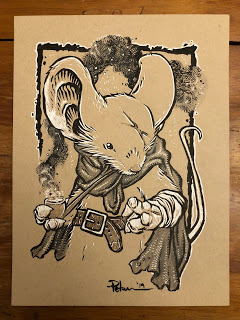 Scarred Guardmouse
Scarred Guardmouse
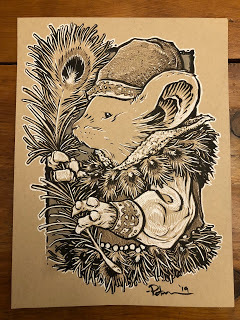 Dandy Mouse
Dandy Mouse
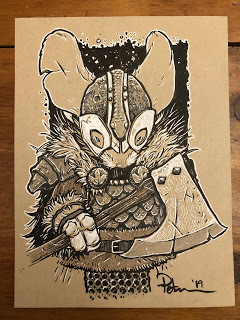 Norse Guard
Norse Guard
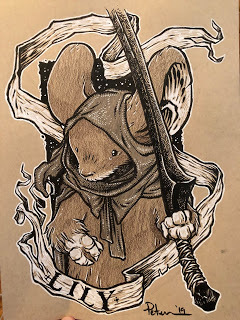 Lily Redfur (a fan's RPG character)
Lily Redfur (a fan's RPG character)
2020 Appearances ***JUST ADDED*** C2E2: Feb. 28-March 1
Emerald City Comic Con: March 12-15FACTS-Ghent Belgium: April 4-5Heroes Con: June 19-21San Diego Comic Con: July 22-26New York Comic Con: October 8-11Baltimore Comic Con: Oct 23-25
 Mouse Baker
Mouse Baker Scarred Guardmouse
Scarred Guardmouse Dandy Mouse
Dandy Mouse Norse Guard
Norse Guard Lily Redfur (a fan's RPG character)
Lily Redfur (a fan's RPG character)2020 Appearances ***JUST ADDED*** C2E2: Feb. 28-March 1
Emerald City Comic Con: March 12-15FACTS-Ghent Belgium: April 4-5Heroes Con: June 19-21San Diego Comic Con: July 22-26New York Comic Con: October 8-11Baltimore Comic Con: Oct 23-25
Published on February 18, 2020 06:00
February 11, 2020
Bricks of the Mouse Guard KICKSTARTER
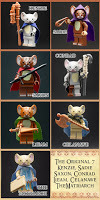 Back in 2015, to celebrate Mouse Guard's 10th anniversary, The Seattle ArchLUG group put on an amazing Mouse Guard LEGO display at Emerald City Comic Con. To have mini-figures for the installation, BOOM! and I licensed Mouse Guard to Guy Himber of Crazy Bricks to manufacture LEGO-Mini-Fig-compatible mouse heads and specialty Mouse Guard accessories.
Back in 2015, to celebrate Mouse Guard's 10th anniversary, The Seattle ArchLUG group put on an amazing Mouse Guard LEGO display at Emerald City Comic Con. To have mini-figures for the installation, BOOM! and I licensed Mouse Guard to Guy Himber of Crazy Bricks to manufacture LEGO-Mini-Fig-compatible mouse heads and specialty Mouse Guard accessories.And in 2020, Guy is Kickstarting another round so that fans of Mouse Guard can not only get the original 7 custom mini-figures--but now five new figures as well!
***KICKSTARTER LINK***
http://kck.st/37mpQVr
The original seven characters were Kenzie, Sadie, Saxon, Conrad, Lieam, Celanawe, and The Matriarch Gwendolyn.
The heads are injection molded ABS plastic color matched to LEGO bodies and then paired with custom accessories and cloaks so you can build in brick you favorite scenes from the Mouse Guard books, your own RPG sessions, or just from your imagination.
But now, Guy has also made new parts and accessories to extent to Midnight, Members of his Army, Disguised Lieam, Bastian, Delvin, & Calla's Ghost:
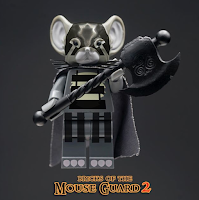
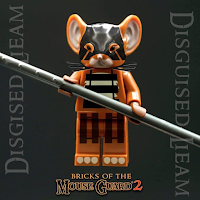
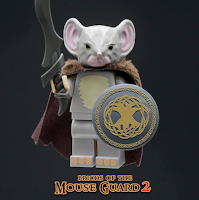
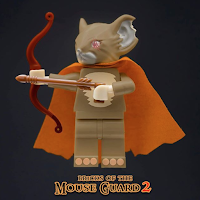
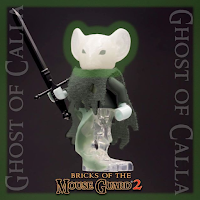
----------------------------------------------
 If you are interested in getting a copy of the photo book published of the installation, 'Mouse Guard: The Art of Bricks' is available *SIGNED* in my online store:
If you are interested in getting a copy of the photo book published of the installation, 'Mouse Guard: The Art of Bricks' is available *SIGNED* in my online store:https://mouseguard.bigcartel.com/product/mouse-guard-art-of-bricks-signed
See sample pages below:

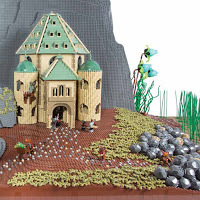
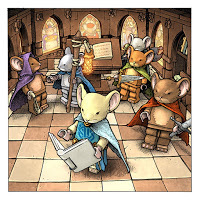
2020 Appearances ***JUST ADDED*** C2E2: Feb. 28-March 1
Emerald City Comic Con: March 12-15FACTS-Ghent Belgium: April 4-5Heroes Con: June 19-21San Diego Comic Con: July 22-26New York Comic Con: October 8-11Baltimore Comic Con: Oct 23-25
Published on February 11, 2020 10:00
February 4, 2020
London Inked Drawings Colored
I spent part of my Christmas/New-Year's Holiday in London, England on a trip with family. While adjusting to the time-change, I'd wake up at odd hours and find time to pencil and ink some little 6" x 6" Mouse Guard piece. I shared the inked images on social media as I completed them. But for today's blogpost, I wanted to share the recent colors I'd done on each after I returned home:
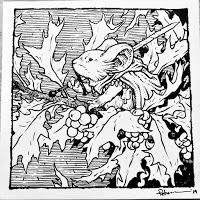
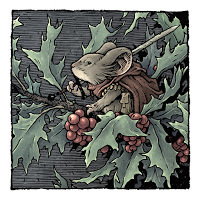
Guardmouse in the Holly.
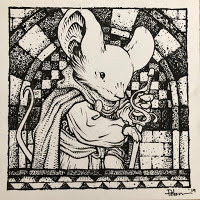
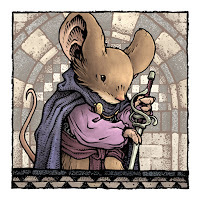 Guardmouse Sela with a stone/tile background based on London's Natural History Museum
Guardmouse Sela with a stone/tile background based on London's Natural History Museum
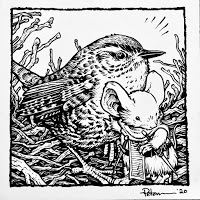
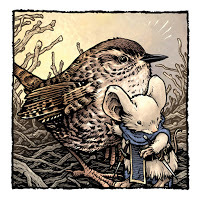
A Guardmouse with a Wren at dawn.
I plan to include these pieces in a future Mouse Guard sketchbook (which does not yet have a release date––but does have a tentative title: 'Dawn, Daye, & Dusk'.
2020 Appearances
Emerald City Comic Con: March 12-15
FACTS-Ghent Belgium: April 4-5
Heroes Con: June 19-21
San Diego Comic Con: July 22-26
New York Comic Con: October 8-11
Baltimore Comic Con: Oct 23-25


Guardmouse in the Holly.

 Guardmouse Sela with a stone/tile background based on London's Natural History Museum
Guardmouse Sela with a stone/tile background based on London's Natural History Museum

A Guardmouse with a Wren at dawn.
I plan to include these pieces in a future Mouse Guard sketchbook (which does not yet have a release date––but does have a tentative title: 'Dawn, Daye, & Dusk'.
2020 Appearances
Emerald City Comic Con: March 12-15
FACTS-Ghent Belgium: April 4-5
Heroes Con: June 19-21
San Diego Comic Con: July 22-26
New York Comic Con: October 8-11
Baltimore Comic Con: Oct 23-25
Published on February 04, 2020 06:00
January 28, 2020
Convention Sign Tutorial Video
 Last year I streamed on Twitch about my convention table signs design. These are the stand-up signs that list what an item is and how much it costs (or I also have a few that list tee-shirt sizes, that the Mouse Guard book series starts with Fall 1152, and that I accept credit cards through Square). I came up with a design for making my signs out of bristol board (6" tiles and blank sketch/business cards) that can stand up well, be adjusted to suit different needs, can be easily edited, and store flat. Here is a video of that stream where I create a few new signs and walk through the process:
Last year I streamed on Twitch about my convention table signs design. These are the stand-up signs that list what an item is and how much it costs (or I also have a few that list tee-shirt sizes, that the Mouse Guard book series starts with Fall 1152, and that I accept credit cards through Square). I came up with a design for making my signs out of bristol board (6" tiles and blank sketch/business cards) that can stand up well, be adjusted to suit different needs, can be easily edited, and store flat. Here is a video of that stream where I create a few new signs and walk through the process:Direct link to YouTube:
https://youtu.be/Rc8k9UcubVI
2020 Appearances Emerald City Comic Con: March 12-15FACTS-Ghent Belgium: April 4-5Heroes Con: June 19-21San Diego Comic Con: July 22-26New York Comic Con: October 8-11Baltimore Comic Con: Oct 23-25
Published on January 28, 2020 06:00
January 21, 2020
Hup: Dark Crystal Age of Resistance Cover
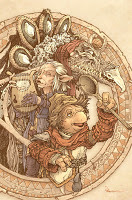 Archaia is publishing a Dark Crystal comic series that ties in with the Netflix series 'Age of Resistance' and I fortunate enough to be asked to do some variant covers for it!
Archaia is publishing a Dark Crystal comic series that ties in with the Netflix series 'Age of Resistance' and I fortunate enough to be asked to do some variant covers for it! The series is made up of three 4 issue arcs, and the second arc is all about everyone's favorite brave spoon wielding podling: Hup!
To the left you can see my finished Hup cover, but below I'll break down all the steps I took to create the cover artwork.
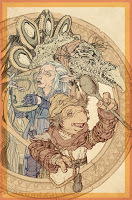 Layout:
Layout:For these Age of Resistance covers, I've wanted to make more of a collage and vignette of characters or scenes from the comic rather than the full body profiles I did of the skeksis and mystics for my last cover-run. I started with pencil drawings of each of the characters I needed to include for this cover: Hup of course, and also a Gelfling bard named Barfinnious and the skeksis treasurer skekShod. All of those were drawn separately on copy paper, scanned in, and then moved, resized, and adjusted to make up a composition using a Froudian circle design as a framing mechanism.
I also did a quick color pass to help me see the characters, predict tangent or value problems, and to make sure Archaia and Henson could clearly see what I was going for.
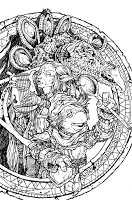 Inks:
Inks:Once Archaia and Henson both approved the layout above, I printed it out at about 10" x 15" (on two sheets of paper that I aligned and taped together) and then taped that printout to the back of a sheet of Strathmore 300 series bristol. On my Huion light pad, I'm able to see through the surface of the bristol, down to the layout to use as my pencil lines while I ink. I used Copic Multiliner SP pens (the 0.3 & 0.7 nibs are my go-to's).
As I inked this I streamed the process on my Twitch Chanel.
And I found out that Victor Yerrid, the performer for Hup, watched part of the stream and was kind enough to reach out and compliment the artwork.
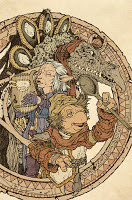 Flat Colors:
Flat Colors:The inks were sent in for approvals before I could start on the first part of the coloring step: flatting. This is where I digitally paint inside the lines with flat colors what color everything should be. I had a lot of the color choices already figured out because of the reference material and my inital rough, but this was also an oppertunity to make any changes--especially in saturation (color intensity) and value (light/dark) of the piece.
I also added a few color holds on the lute strings and the leather band on Hup's arm. Color holds are where I can choose to paint the line art color other than black.
 Final Colors:
Final Colors:For the final colors, I use the dodge and burn tools in Photoshop to add highlights and shadows as well as texture. I added a little parchment-wash overlay to mute everything out and called the piece done.
Dark Crystal Age of Resistance: Hup begins this month, and my cover will be on next month's issue #6!
2020 Convention Appearances to be announced soon...
Published on January 21, 2020 06:00
Hup: Dark Crystal Age or Resistance Cover
 Archaia is publishing a Dark Crystal comic series that ties in with the Netflix series 'Age of Resistance' and I fortunate enough to be asked to do some variant covers for it!
Archaia is publishing a Dark Crystal comic series that ties in with the Netflix series 'Age of Resistance' and I fortunate enough to be asked to do some variant covers for it! The series is made up of three 4 issue arcs, and the second arc is all about everyone's favorite brave spoon wielding podling: Hup!
To the left you can see my finished Hup cover, but below I'll break down all the steps I took to create the cover artwork.
 Layout:
Layout:For these Age of Resistance covers, I've wanted to make more of a collage and vignette of characters or scenes from the comic rather than the full body profiles I did of the skeksis and mystics for my last cover-run. I started with pencil drawings of each of the characters I needed to include for this cover: Hup of course, and also a Gelfling bard named Barfinnious and the skeksis treasurer skekShod. All of those were drawn separately on copy paper, scanned in, and then moved, resized, and adjusted to make up a composition using a Froudian circle design as a framing mechanism.
I also did a quick color pass to help me see the characters, predict tangent or value problems, and to make sure Archaia and Henson could clearly see what I was going for.
 Inks:
Inks:Once Archaia and Henson both approved the layout above, I printed it out at about 10" x 15" (on two sheets of paper that I aligned and taped together) and then taped that printout to the back of a sheet of Strathmore 300 series bristol. On my Huion light pad, I'm able to see through the surface of the bristol, down to the layout to use as my pencil lines while I ink. I used Copic Multiliner SP pens (the 0.3 & 0.7 nibs are my go-to's).
As I inked this I streamed the process on my Twitch Chanel.
And I found out that Victor Yerrid, the performer for Hup, watched part of the stream and was kind enough to reach out and compliment the artwork.
 Flat Colors:
Flat Colors:The inks were sent in for approvals before I could start on the first part of the coloring step: flatting. This is where I digitally paint inside the lines with flat colors what color everything should be. I had a lot of the color choices already figured out because of the reference material and my inital rough, but this was also an oppertunity to make any changes--especially in saturation (color intensity) and value (light/dark) of the piece.
I also added a few color holds on the lute strings and the leather band on Hup's arm. Color holds are where I can choose to paint the line art color other than black.
 Final Colors:
Final Colors:For the final colors, I use the dodge and burn tools in Photoshop to add highlights and shadows as well as texture. I added a little parchment-wash overlay to mute everything out and called the piece done.
Dark Crystal Age of Resistance: Hup begins this month, and my cover will be on next month's issue #6!
2020 Convention Appearances to be announced soon...
Published on January 21, 2020 06:00
January 14, 2020
Sharon Petersen Obituary
My Mom passed away last Friday after struggles with Parkinson’s and Dementia—but also after a joyful lifetime of sewing, crafting, and genealogy. She is now at peace.
She encouraged and nurtured in me a love of crafting and making. She pushed for enrollment in art classes, stuffed Christmas stocking full of art supplies, and attended every event where my work was on display. I couldn't have asked for a more supportive Mom of my artistic career.
Below I'm sharing the obituary my sister Lesa wrote for her as well as lots of photos of her life.
The obituary is also on MLive with a guestbook: https://obits.mlive.com/obituaries/flint/obituary.aspx?n=sharon-petersen&pid=195022758










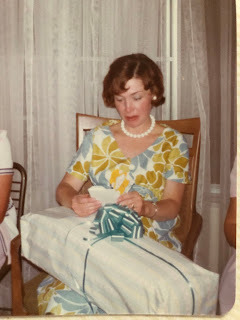


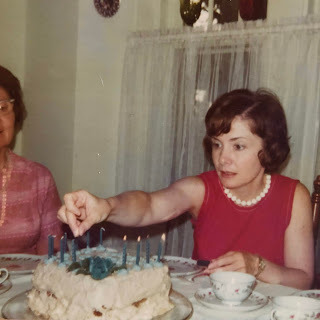


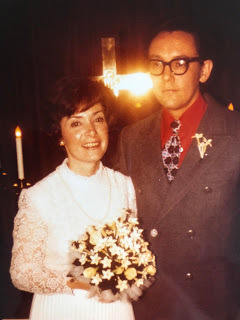









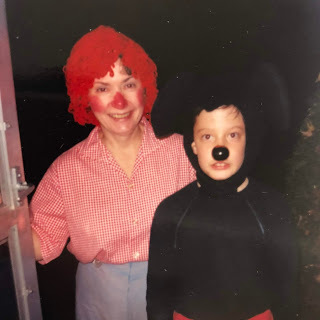


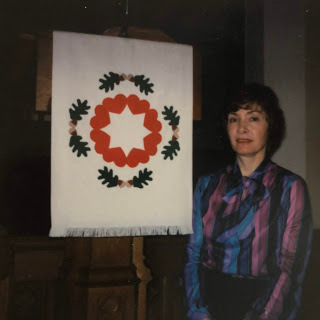
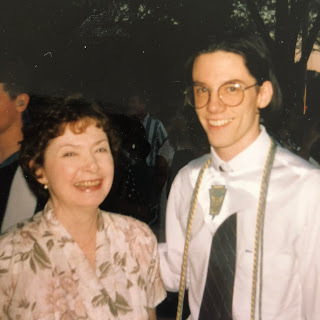



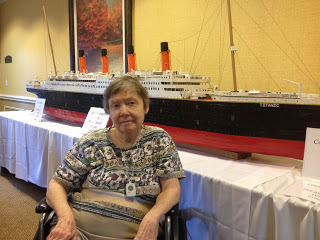









She encouraged and nurtured in me a love of crafting and making. She pushed for enrollment in art classes, stuffed Christmas stocking full of art supplies, and attended every event where my work was on display. I couldn't have asked for a more supportive Mom of my artistic career.
Below I'm sharing the obituary my sister Lesa wrote for her as well as lots of photos of her life.
Sharon Ann Petersen
passed from complications of Parkinson's Disease on January 10, 2020, at age 81 in Beaumont Hospital hospice care in Royal Oak, Mich. Born Sharon Winters on May 27, 1938, in Flint, Michigan, she was the daughter of Clair and Marguerite Winters.
Sharon graduated from Flint Central High School in 1956 and studied at the University of Hawaii before returning home to earn her nursing degree at Mott Community College in 1974.
In 1972, she married Eric Petersen and became a loving stepmother to his two daughters, Kirsten and Lesa. On July 4, 1977, the family was delighted to welcome Sharon and Eric's son, David.
Sharon was small in stature but mighty in spirit. Her constant creative undertakings included sewing and embroidering dressings for the interior of Oak Park United Methodist Church in Flint and for the robes of its pastors and choir members. At Oak Park and in the schools Kirsten, Lesa, and David attended, she contributed passionately to every fundraiser, music and theater performance, art fair, spirit parade, and community dinner with her creativity and generosity.
She was a gifted seamstress and loved sewing and quilting, crafting, and making elaborate, beautiful cakes. An expert self-taught genealogist who was active in the Flint Genealogical Society, she often trekked to genealogical libraries in the Midwest as she mapped her family's lineage.
She spent her last years in the loving care of son David and daughter-in-law Julia at their home in Ferndale, Mich.
She is preceded by her sister Nancy, her brother Richard, and her parents.
A ceremony celebrating Sharon's life will be held in May.
The obituary is also on MLive with a guestbook: https://obits.mlive.com/obituaries/flint/obituary.aspx?n=sharon-petersen&pid=195022758












































Published on January 14, 2020 06:00
January 7, 2020
'Mouse Guard and the criticism of spectacle-obsessed fantasy'
I recently came across this wonderful article by Dan Silva about some of my avoidance for might-makes-right fantasy battles in Mouse Guard. I wanted to share his writing and thoughts with you.
Mouse Guard & the criticism of spectacle-obsessed fantasyby Dan Silva
Last October, I began reading Mouse Guard, a series of graphic novels by David Petersen about members of an organization of cloaked sword-wielding mice who protect their (literally) tiny civilization from the dangers of a world full of predators. There are three main books (Fall 1152, Winter 1152, and The Black Axe, a prequel) with a fourth currently in development, a side series of collaborative stories called Legends of the Guard, and collection of one-off stories released for Free Comic Book Day, most of which have been collected in the book Baldwin the Brave and Other Tales, and the two which have not been collected in hardcover format are available as readings on Petersen’s Youtube channel. There is also a tabletop RPG built in the Burning Wheel system, a common point of introduction to the series for many. A movie based on the first book was to be released by 20th Century Fox, but was cancelled a week into production following the Disney merger.
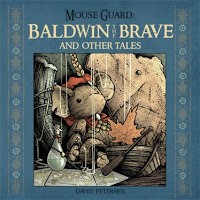 In the series, and in the Free Comic Book Day stories in particular, a recurring theme can be found. The stories contain a sort of rejection to the violent spectacles typically found in fantasy pop-culture. Three stories in particular emphasize this: Thane and Ilsa, Service to Seyan, and Piper the Listener, and the lessons they impart coalesce into the third volume, The Black Axe.
In the series, and in the Free Comic Book Day stories in particular, a recurring theme can be found. The stories contain a sort of rejection to the violent spectacles typically found in fantasy pop-culture. Three stories in particular emphasize this: Thane and Ilsa, Service to Seyan, and Piper the Listener, and the lessons they impart coalesce into the third volume, The Black Axe.
Thane and Ilsa, and the unimportance of superiority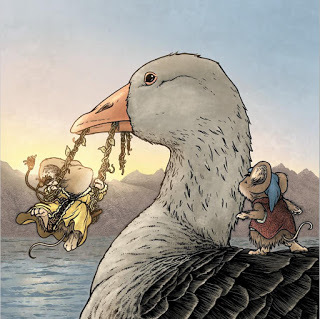 Cover art for The Tale of Thane and Ilsa (Source:Baldwin the Brave and Other Tales)
Cover art for The Tale of Thane and Ilsa (Source:Baldwin the Brave and Other Tales)
Stories all throughout pop culture will emphasize the importance of major characters by making them stronger or more skilled at something than the average person. It’s the basic concept behind entire genres. While such a ubiquitous writing concept is not inherently bad, it has manifested in ways that can taint the way people interpret pop culture. People will judge characters based solely on their “usefulness” in fight scenes. Superheroes are only as interesting as their competence, characterization be damned. Protagonists in video games and anime will often have “is good at everything” as their only defining trait.
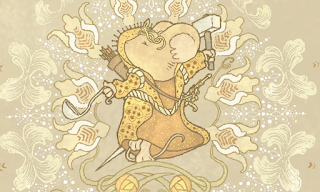
Source: Baldwin the Brave and Other Tales
The story of Thane and Ilsa, like most of the Free Comic Book Day stories, is framed by a main series character being told a story as a child. In this case, a teenage Sadie (a guardmouse seen in the first two volumes) is told a story by her concerned father about the importance of love in response to her being overly familiar with the patrons of his tavern. In his story, a female mouse named Ilsa with unparalleled skill in all trades is sought after by would-be suitors. To resolve this, she holds a tourney of skills and trades to see who is deserving of her love. Although Ilsa is never critical of their skills, nearly all of the would-be suitors eventually quit, distraught in their inability to best her in her skills.Eventually, after nearly all the suitors have been weeded out, Ilsa offers a final challenge: a dangerous journey out of and back into the territories (the realm the mice live in) ending in a swim to an island where she would be waiting. Only one mouse is able to commit to this journey, a boatcrafter named Thane. Although a fine boatcrafter, he lacks any other skill beside loving Ilsa. He had failed at nearly every task and simply remained in the competition out of a refusal to quit. He struggles throughout the journey, barely making it to the end, and crafts a boat to the island instead of swimming. In his mind, he sees this attempt as pathetic, and that he is unworthy of Ilsa’s love.
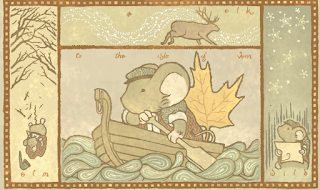
Source: Baldwin the Brave and Other Stories
Upon arrival, the following exchange is had:
In the final panel, Sadie’s father reveals the two mice in the story were himself and her mother. He intended to teach Sadie that he had not “won” his wife through accomplishing feats, but that it was his commitment to love that led to their marriage, as opposed to Sadie’s fantasy of being whisked away by some dashing rogue she met in a tavern. A wandering hero, if you will.
Service to Seyan, & the deromanticizing of the wandering action hero
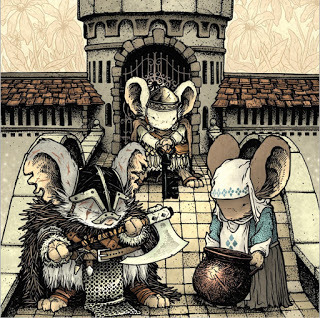
Source: Baldwin the Brave and Other Tales
A classic fantasy archetype is the wandering action hero, who travels the land fighting evil and righting wrongs. Stories throughout history have made this sort of character the hero, perhaps given them some allies to journey alongside, but just as often make them a loner who cannot be bested in a fight. This is especially common in video games and tabletop RPGs such as Dungeons and Dragons, as such games are typically designed with combat in mind first and all other parts second. This has led tabletop RPG enthusiasts to dub such characters “murderhobos” as they are often effectively homeless and typically solve all their problems through murdering the villains.
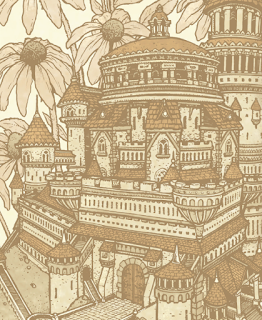 Service to Seyan is framed by a young Gwendolyn (The matriarch of the titular mouse guard, effectively the head administrator of the group) asks her adoptive mother, Leah, of her late birth mother, who she misses despite having never met her. To dissuade her concerns. Leah tells her about Seyan, the afterlife of mousekind where heroes like her mother rest, and a story of one such hero.
Service to Seyan is framed by a young Gwendolyn (The matriarch of the titular mouse guard, effectively the head administrator of the group) asks her adoptive mother, Leah, of her late birth mother, who she misses despite having never met her. To dissuade her concerns. Leah tells her about Seyan, the afterlife of mousekind where heroes like her mother rest, and a story of one such hero.
In the story, two mice arrive at the gates of Seyan and are instructed by it’s gatekeeper, Sefatus, to tell of their victories and sacrifices. The first mouse is Ragnier the Hunter, a legendary warrior mouse who slew countless predators with unparalleled might, even travelling outside the territories to slay bigger and larger beasts to keep them from entering. He is, essentially, a traditional fantasy protagonist. Ragnier is confident he will be permitted into Seyan, as his victories are ones few mice can claim and his sacrifices can be found scarred across his body.
The second mouse is Alma, a cook who travelled the land feeding people delicious meals with whatever ingredients were on hand in exchange for shelter and protection. Generally speaking, she is the archetypical female secondary character. She feels her victories and sacrifices could not compare to Ragnier’s in the slightest.To both of their surprise, Ragnier is denied entrance. His merciless slaying was not out of a desire to protect, but rampant bloodlust and a desire for a legendary reputation. Alma, however, is permitted in, for her kindness and willingness to help others were of greater help to all life. She even fed the surviving orphans of Ragnier’s rampages. Leah concludes the story by telling Gwendolyn that when her times comes, she too will join her mother in Seyan, she simply need to choose a method to help the world.

Source: Baldwin the Brave and Other Tales
A more traditional fantasy story starring the two would not question Ragnier’s life, and likely even celebrate it, and while Alma would not necessarily suffer for her kindness, she would be considered by readers to be of lesser importance, and narratively would more likely serve as an outlet for whatever manpain Ragnier would have. But Seyan is no Valhalla, and violence alone does not a hero make. But of course, in order for the wandering action hero to function as a protagonist, they need something to kill.
Piper the Listener, and humanizing the nonhuman
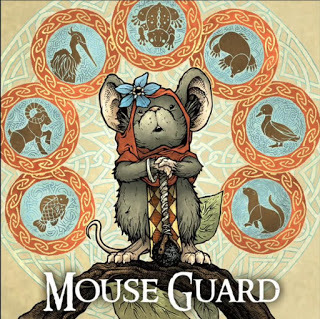
Source: Mouse Guard: Piper the Listener Reading
In fantasy pop culture, a protagonist will need large groups of enemies that they can kill easily, in great number, and without remorse. Popular picks include bandits, predatory monsters, and “evil races” (the classic examples being orcs and goblins). And of course, the latter two do show up to a certain capacity. The first chapter of Fall 1152 features the central protagonist, Lieam, slaying a snake (which compared mice are giant) and Winter 1152 alludes to a war the took place 3 years prior between mice and weasels, and heavily suggests the weasels were aiming for total genocide of mousekind. But as Petersen has continued his writing, he has aimed to make it clear that predators are not necessarily all evil as a whole and do not deserve to be treated as fodder, and a prime example of this is the 2016 free comic day story, Piper the Listener.
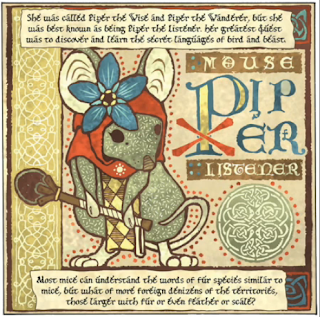 This story is a little different in its framing compared to the previous two stories, as the child mouse, Celanawe (pronounced Kel-en-awe), does not have anyone to tell him a story. In fact, the story begins with him writing in a diary that his family has grown distant since the untimely death of his sister. Instead Celanawe himself is telling the story, recounting it in the diary to occupy his mind in this difficult period of his life.
This story is a little different in its framing compared to the previous two stories, as the child mouse, Celanawe (pronounced Kel-en-awe), does not have anyone to tell him a story. In fact, the story begins with him writing in a diary that his family has grown distant since the untimely death of his sister. Instead Celanawe himself is telling the story, recounting it in the diary to occupy his mind in this difficult period of his life.
The tale tells of a mouse named Piper who sought to learn the languages of all beasts. While species closer in nature to mice speak roughly the same, the further away a creature got from a mouse, the more difficult they became to understand. In her travels, she comes to understand not only these beings languages, but their cultures. The mole concerns himself with the cooking methods of insects, while the duck complains about politics of waterfowl society.
Towards the end of her journey, she dares to learn the language of the snake, a natural predator of mice. While terrifying and requiring having to hide to even hear their words, she discovers snakes have rich history and culture, the one she listens in on reciting finely crafted poetry to themself. The story ends with Piper concluding “just because you cannot understand a creature doesn’t mean they haven’t anything important to say”.The young Celanawe finds himself wishing to learn the languages of beast as well, hoping that they will provide him companionship in his lonely life. Unfortunately for him, his fate will be as far from that as possible.
The Black Axe, and the tragedy of being a hero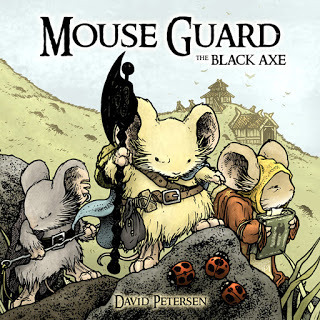
The third volume, The Black Axe, takes place many decades before the first two volumes (in which he is an old mouse) and opens with him as a guardmouse. He meets Em of Appleloft, who reveals herself to be a distant relative and begs him to help her retrieve The Black Axe, a legendary weapon passed down from mouse to mouse, with them taking up a persona of the same name in a Dread Pirate Roberts-esque fashion. He agrees when Em reveals that Bronwyn, the current matriarch and the love of his life, has sent him instructions asking such. This involves hiring a mouse named Conrad to take them across the sea with the promise of returning with a reputation that would earn him the position of the Captain of Captains (the leader of the port town they depart from).
The journey is long and perilous, and they barely manage to make it to their destination alive. Celanawe and Em meet with a ferret king, who agrees to return the axe in exchange for avenging his son who has died to a fox, with the condition that Em remain with him until Celanawe returns.Celanawe is able to slay the fox, but Conrad gets his leg severed in the process. Nonetheless, Celanawe is victorious.
This is the last truly triumphant moment in Celanawe’s life.After killing the fox, he discovers in doing so he has orphaned the fox’s pups.He returns to the ferret king to learn Em was killed by an overeager healer wishing to better learn mouse anatomy, accidentally crushing her in in his hands in the process.He travels back home to discover that Bronwyn was killed fighting a wolf a few days prior, and that to keep his journey secret, he had been declared In Damnatio Memoriae and all records of his existence destroyed.
He attempts to confide in his one remaining friend, Conrad, only to find out that Conrad hates him for severing his leg and because nobody believed the story he came back with.With nothing left in life but a finely crafted axe and scarring from a series of traumatic experiences, there is only one thing left for him to do: take up the persona of The Black Axe, travel the land as a wandering action hero, slay beasts and other threats to protect the greater good, and ultimately, only be valued for his ability to kill things.
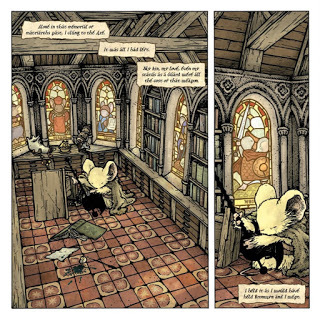 Source: Mouse Guard Volume 3: The Black Axe
Source: Mouse Guard Volume 3: The Black Axe
Original article Link:https://medium.com/@dsilva72794/mouse-guard-and-the-criticism-of-spectacle-obsessed-fantasy-fa6a5e648af2
Mouse Guard & the criticism of spectacle-obsessed fantasyby Dan Silva
Last October, I began reading Mouse Guard, a series of graphic novels by David Petersen about members of an organization of cloaked sword-wielding mice who protect their (literally) tiny civilization from the dangers of a world full of predators. There are three main books (Fall 1152, Winter 1152, and The Black Axe, a prequel) with a fourth currently in development, a side series of collaborative stories called Legends of the Guard, and collection of one-off stories released for Free Comic Book Day, most of which have been collected in the book Baldwin the Brave and Other Tales, and the two which have not been collected in hardcover format are available as readings on Petersen’s Youtube channel. There is also a tabletop RPG built in the Burning Wheel system, a common point of introduction to the series for many. A movie based on the first book was to be released by 20th Century Fox, but was cancelled a week into production following the Disney merger.
 In the series, and in the Free Comic Book Day stories in particular, a recurring theme can be found. The stories contain a sort of rejection to the violent spectacles typically found in fantasy pop-culture. Three stories in particular emphasize this: Thane and Ilsa, Service to Seyan, and Piper the Listener, and the lessons they impart coalesce into the third volume, The Black Axe.
In the series, and in the Free Comic Book Day stories in particular, a recurring theme can be found. The stories contain a sort of rejection to the violent spectacles typically found in fantasy pop-culture. Three stories in particular emphasize this: Thane and Ilsa, Service to Seyan, and Piper the Listener, and the lessons they impart coalesce into the third volume, The Black Axe.Thane and Ilsa, and the unimportance of superiority
 Cover art for The Tale of Thane and Ilsa (Source:Baldwin the Brave and Other Tales)
Cover art for The Tale of Thane and Ilsa (Source:Baldwin the Brave and Other Tales)Stories all throughout pop culture will emphasize the importance of major characters by making them stronger or more skilled at something than the average person. It’s the basic concept behind entire genres. While such a ubiquitous writing concept is not inherently bad, it has manifested in ways that can taint the way people interpret pop culture. People will judge characters based solely on their “usefulness” in fight scenes. Superheroes are only as interesting as their competence, characterization be damned. Protagonists in video games and anime will often have “is good at everything” as their only defining trait.

Source: Baldwin the Brave and Other Tales
The story of Thane and Ilsa, like most of the Free Comic Book Day stories, is framed by a main series character being told a story as a child. In this case, a teenage Sadie (a guardmouse seen in the first two volumes) is told a story by her concerned father about the importance of love in response to her being overly familiar with the patrons of his tavern. In his story, a female mouse named Ilsa with unparalleled skill in all trades is sought after by would-be suitors. To resolve this, she holds a tourney of skills and trades to see who is deserving of her love. Although Ilsa is never critical of their skills, nearly all of the would-be suitors eventually quit, distraught in their inability to best her in her skills.Eventually, after nearly all the suitors have been weeded out, Ilsa offers a final challenge: a dangerous journey out of and back into the territories (the realm the mice live in) ending in a swim to an island where she would be waiting. Only one mouse is able to commit to this journey, a boatcrafter named Thane. Although a fine boatcrafter, he lacks any other skill beside loving Ilsa. He had failed at nearly every task and simply remained in the competition out of a refusal to quit. He struggles throughout the journey, barely making it to the end, and crafts a boat to the island instead of swimming. In his mind, he sees this attempt as pathetic, and that he is unworthy of Ilsa’s love.

Source: Baldwin the Brave and Other Stories
Upon arrival, the following exchange is had:
On the Isle of Venn, he found her waiting and she nodded at him lovingly. He cried and exclaimed, “I am here, but I should not be, for I did poorly and cannot match you in any deed.”
“Then why are you here?” she asked.
“Because I love you.” he said.
And she replied, “Then your love is bigger than all of the tasks. I can cook, and smith, and swim, and fight enough for the both of us, but it would be a poor union if I also had to do the loving for us both.”
In the final panel, Sadie’s father reveals the two mice in the story were himself and her mother. He intended to teach Sadie that he had not “won” his wife through accomplishing feats, but that it was his commitment to love that led to their marriage, as opposed to Sadie’s fantasy of being whisked away by some dashing rogue she met in a tavern. A wandering hero, if you will.
Service to Seyan, & the deromanticizing of the wandering action hero

Source: Baldwin the Brave and Other Tales
A classic fantasy archetype is the wandering action hero, who travels the land fighting evil and righting wrongs. Stories throughout history have made this sort of character the hero, perhaps given them some allies to journey alongside, but just as often make them a loner who cannot be bested in a fight. This is especially common in video games and tabletop RPGs such as Dungeons and Dragons, as such games are typically designed with combat in mind first and all other parts second. This has led tabletop RPG enthusiasts to dub such characters “murderhobos” as they are often effectively homeless and typically solve all their problems through murdering the villains.
 Service to Seyan is framed by a young Gwendolyn (The matriarch of the titular mouse guard, effectively the head administrator of the group) asks her adoptive mother, Leah, of her late birth mother, who she misses despite having never met her. To dissuade her concerns. Leah tells her about Seyan, the afterlife of mousekind where heroes like her mother rest, and a story of one such hero.
Service to Seyan is framed by a young Gwendolyn (The matriarch of the titular mouse guard, effectively the head administrator of the group) asks her adoptive mother, Leah, of her late birth mother, who she misses despite having never met her. To dissuade her concerns. Leah tells her about Seyan, the afterlife of mousekind where heroes like her mother rest, and a story of one such hero.In the story, two mice arrive at the gates of Seyan and are instructed by it’s gatekeeper, Sefatus, to tell of their victories and sacrifices. The first mouse is Ragnier the Hunter, a legendary warrior mouse who slew countless predators with unparalleled might, even travelling outside the territories to slay bigger and larger beasts to keep them from entering. He is, essentially, a traditional fantasy protagonist. Ragnier is confident he will be permitted into Seyan, as his victories are ones few mice can claim and his sacrifices can be found scarred across his body.
The second mouse is Alma, a cook who travelled the land feeding people delicious meals with whatever ingredients were on hand in exchange for shelter and protection. Generally speaking, she is the archetypical female secondary character. She feels her victories and sacrifices could not compare to Ragnier’s in the slightest.To both of their surprise, Ragnier is denied entrance. His merciless slaying was not out of a desire to protect, but rampant bloodlust and a desire for a legendary reputation. Alma, however, is permitted in, for her kindness and willingness to help others were of greater help to all life. She even fed the surviving orphans of Ragnier’s rampages. Leah concludes the story by telling Gwendolyn that when her times comes, she too will join her mother in Seyan, she simply need to choose a method to help the world.

Source: Baldwin the Brave and Other Tales
A more traditional fantasy story starring the two would not question Ragnier’s life, and likely even celebrate it, and while Alma would not necessarily suffer for her kindness, she would be considered by readers to be of lesser importance, and narratively would more likely serve as an outlet for whatever manpain Ragnier would have. But Seyan is no Valhalla, and violence alone does not a hero make. But of course, in order for the wandering action hero to function as a protagonist, they need something to kill.
Piper the Listener, and humanizing the nonhuman

Source: Mouse Guard: Piper the Listener Reading
In fantasy pop culture, a protagonist will need large groups of enemies that they can kill easily, in great number, and without remorse. Popular picks include bandits, predatory monsters, and “evil races” (the classic examples being orcs and goblins). And of course, the latter two do show up to a certain capacity. The first chapter of Fall 1152 features the central protagonist, Lieam, slaying a snake (which compared mice are giant) and Winter 1152 alludes to a war the took place 3 years prior between mice and weasels, and heavily suggests the weasels were aiming for total genocide of mousekind. But as Petersen has continued his writing, he has aimed to make it clear that predators are not necessarily all evil as a whole and do not deserve to be treated as fodder, and a prime example of this is the 2016 free comic day story, Piper the Listener.
 This story is a little different in its framing compared to the previous two stories, as the child mouse, Celanawe (pronounced Kel-en-awe), does not have anyone to tell him a story. In fact, the story begins with him writing in a diary that his family has grown distant since the untimely death of his sister. Instead Celanawe himself is telling the story, recounting it in the diary to occupy his mind in this difficult period of his life.
This story is a little different in its framing compared to the previous two stories, as the child mouse, Celanawe (pronounced Kel-en-awe), does not have anyone to tell him a story. In fact, the story begins with him writing in a diary that his family has grown distant since the untimely death of his sister. Instead Celanawe himself is telling the story, recounting it in the diary to occupy his mind in this difficult period of his life.The tale tells of a mouse named Piper who sought to learn the languages of all beasts. While species closer in nature to mice speak roughly the same, the further away a creature got from a mouse, the more difficult they became to understand. In her travels, she comes to understand not only these beings languages, but their cultures. The mole concerns himself with the cooking methods of insects, while the duck complains about politics of waterfowl society.
Towards the end of her journey, she dares to learn the language of the snake, a natural predator of mice. While terrifying and requiring having to hide to even hear their words, she discovers snakes have rich history and culture, the one she listens in on reciting finely crafted poetry to themself. The story ends with Piper concluding “just because you cannot understand a creature doesn’t mean they haven’t anything important to say”.The young Celanawe finds himself wishing to learn the languages of beast as well, hoping that they will provide him companionship in his lonely life. Unfortunately for him, his fate will be as far from that as possible.
The Black Axe, and the tragedy of being a hero

The third volume, The Black Axe, takes place many decades before the first two volumes (in which he is an old mouse) and opens with him as a guardmouse. He meets Em of Appleloft, who reveals herself to be a distant relative and begs him to help her retrieve The Black Axe, a legendary weapon passed down from mouse to mouse, with them taking up a persona of the same name in a Dread Pirate Roberts-esque fashion. He agrees when Em reveals that Bronwyn, the current matriarch and the love of his life, has sent him instructions asking such. This involves hiring a mouse named Conrad to take them across the sea with the promise of returning with a reputation that would earn him the position of the Captain of Captains (the leader of the port town they depart from).
The journey is long and perilous, and they barely manage to make it to their destination alive. Celanawe and Em meet with a ferret king, who agrees to return the axe in exchange for avenging his son who has died to a fox, with the condition that Em remain with him until Celanawe returns.Celanawe is able to slay the fox, but Conrad gets his leg severed in the process. Nonetheless, Celanawe is victorious.
This is the last truly triumphant moment in Celanawe’s life.After killing the fox, he discovers in doing so he has orphaned the fox’s pups.He returns to the ferret king to learn Em was killed by an overeager healer wishing to better learn mouse anatomy, accidentally crushing her in in his hands in the process.He travels back home to discover that Bronwyn was killed fighting a wolf a few days prior, and that to keep his journey secret, he had been declared In Damnatio Memoriae and all records of his existence destroyed.
He attempts to confide in his one remaining friend, Conrad, only to find out that Conrad hates him for severing his leg and because nobody believed the story he came back with.With nothing left in life but a finely crafted axe and scarring from a series of traumatic experiences, there is only one thing left for him to do: take up the persona of The Black Axe, travel the land as a wandering action hero, slay beasts and other threats to protect the greater good, and ultimately, only be valued for his ability to kill things.
 Source: Mouse Guard Volume 3: The Black Axe
Source: Mouse Guard Volume 3: The Black AxeOriginal article Link:https://medium.com/@dsilva72794/mouse-guard-and-the-criticism-of-spectacle-obsessed-fantasy-fa6a5e648af2
Published on January 07, 2020 06:00
David Petersen's Blog
- David Petersen's profile
- 339 followers
David Petersen isn't a Goodreads Author
(yet),
but they
do have a blog,
so here are some recent posts imported from
their feed.



